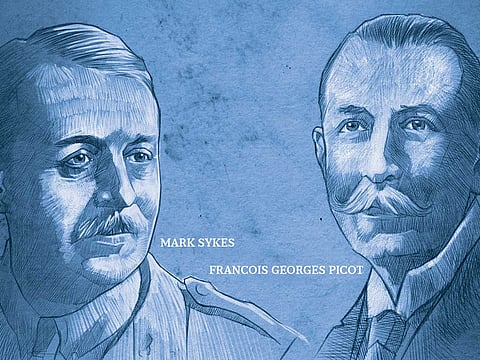Lines in the sand that divided the Arab world
Secret Sykes-Picot deal signed 100 years ago to carve up Ottoman Empire has had terrible effect on region

One hundred years ago this month, in the middle of the First World War, a secret agreement was concluded between Britain and France to carve up the Ottoman Empire, which has had a terrible effect on the Arab world right up today.
The two junior diplomats, Mark Sykes on behalf of Britain and Francois George-Picot for France, divided the Arab lands into two spheres of influence: Area A for France, including Syria and Lebanon and Area B for Britain including Iraq, Transjordan and Palestine. In those areas, Britain and France were to be allowed to establish whatever such direct or indirect governments or control as they desired.
The 1916 Sykes-Picot agreement had to be secret because it went completely against the promises given to the Hashemite leader Hussain Bin Ali, the Emir of Makkah, that Arabs would eventually receive independence if they supported the Allies against the Ottomans,
This came even as Emir Hussain mustered Arab forces to fight alongside the British for the next two years and help achieve the end of Ottoman rule over the Arab Middle East.
The Sykes-Picot agreement became public knowledge when the Bolsheviks seized power in 1917 and found copies of the “treacherous” documents which they revealed to the world, and proved to the Arabs the duplicity of their “allies”.
Born of western imperialism and colonialism, the Sykes-Picot agreement became the basis of the UN mandates after the end of the war, and helped define the future boundaries of the Arab nation states that remained under British or French colonial rule, which in turn became a key factor behind the rise of military dictatorships in the 1950s and 1960s.
Throughout the decades, the Sykes-Picot agreement has served as a constant reminder to Arabs of continued western meddling in their affairs.
It also set the region on a turbulent course of misery and conflict. The legacy of Sykes-Picot can be felt today in several countries – including Iraq, Syria and most terribly, Palestine. Moreover, as western powers are again involved in Syria, memories of Sykes-Picot and its betrayals shape Arab fears that the West is still not finished with interfering in the region.



